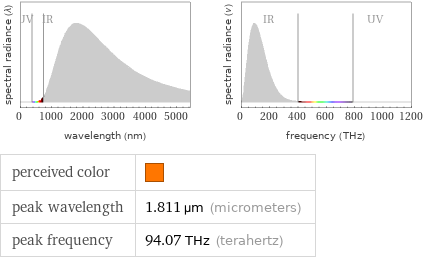Input interpretation

potassium hydroxide | boiling point
Result

1327 °C (degrees Celsius)
Unit conversions

1600 K (kelvins)

2421 °F (degrees Fahrenheit)

2880 °R (degrees Rankine)

1062 °Ré (degrees Réaumur)

704.2 °Rø (degrees Rømer)
Comparisons as temperature

211 °C below melting point of iron (1538 °C)

70 °C below temperature in the blue part of a candle flame (1670 K)

(20 to 600) °C above typical temperature of magma (700 to 1300 °C)
Blackbody information

perceived color | peak wavelength | 1.811 µm (micrometers) peak frequency | 94.07 THz (terahertz)
Corresponding quantities

Thermodynamic energy E from E = kT: | 14 ceV (centielectronvolts)

Blackbody energy flux Φ from Φ = σT^4: | 371753 W/m^2 (watts per square meter)

Approximate luminous exitance from a planar blackbody radiator perpendicular to its surface: | 67255 lx (lux)